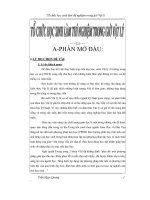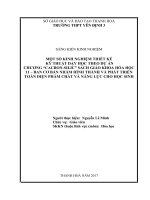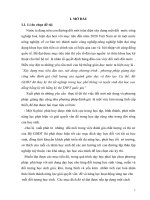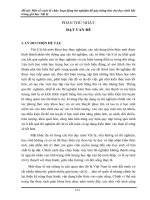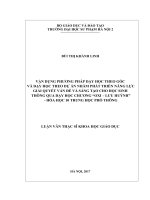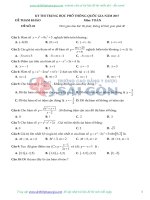ĐỀ THI DỰ ĐOÁN THEO FORM 2022
Bạn đang xem bản rút gọn của tài liệu. Xem và tải ngay bản đầy đủ của tài liệu tại đây (80.82 KB, 6 trang )
Mark the letter A, B, C, or D on your answer sheet to indicate the word
whose underlined part differs from the other three in pronunciation in
each of the following questions.
Question 1. A. low
B. hot
C. sold
D. pole
Question 2. A. carried
B. demanded
C. received
D. retired
Mark the letter A, B, C, or D on your answer sheet to indicate the word
that differs from the other three in the position of the primary stress in
each of the following questions.
Question 3. A. tourist
B. sunshine
C. weather
D. control
Question 4. A. attentive B. disabled
C. powerful D. effective
Mark the letter A, B, C, or D on your answer sheet to indicate the most
suitable response to complete each of the following exchanges.
Question 5. Martin is asking Vic for advice.
- Martin: “Do you think which shirt suits me better?”
- Vic: “_________”
A. Thanks anyway.
B. The red one.
C. No problem.
D. I bought this one.
Question 6. Susan and Laura are talking about robots.
- Susan: “I believe that manual workers will be completely replaced by robots.”
- Laura: “________. They will be retrained to take on other duties.”
A. I don’t think so
B. You’re exactly right
C. That’s what I think
D. There’s no
doubt about it
Mark the letter A, B, C, or D on your answer sheet to indicate the
word(s) CLOSEST in meaning to the underlined bold word(s) in each of
the following questions.
Question 7. It was a really tricky maths question; I had to spend the whole
afternoon finding an answer to it.
A. slow
B. difficult
C. easy
D. quick
Question 8. The passion for writing from a very young age drove him to
become a novelist.
A. interest
B. responsibility
C. suitability
D. growth
Mark the letter A, B, C, or D on your answer sheet to indicate the
word(s) OPPOSITE in meaning to the underlined word(s) in each of the
following questions.
Question 9. The company was heavily criticised for releasing a lot of toxic
substances into the local river.
A. attended
B. pretended
C. blamed
D. praised
Question 10. We may not find a solution right now, but don’t lose sleep over
it. We can have another discussion tomorrow.
A. change our attitude towards
B. delay making a decision on
C. worry much about
D. feel relaxed about
Mark the letter A, B, C, or D on your answer sheet to indicate the
correct answer to each of the following questions.
Question 11. The festival ______ in the community centre every year.
A. was held
B. is held
C. has held
D. had held
Question 12. Jones couldn’t attend the seminar ______ he missed the train.
A. though
B. in spite of
C. because of
D. because
Question 13. This printer is quite new, ______?
A. wasn’t it
B. doesn’t it
C. hasn’t it
D. isn’t it
1
Question 14. If painted in oils, ______.
A. she received a lot of compliments
B. the artist made a real effort
C. the picture would look more appealing D. the audience had to pay a higher
price
Question 15. We have to raise our ______ if we want to survive in this
competitive market.
A. lunch
B. game
C. hand
D. name
Question 16. Kyle was opening the door when someone ______ his name.
A. has called
B. is calling
C. had called
D. called
Question 17. ______ students attend the event, the happier we are.
A. The most
B. More
C. The more
D. Most of
Question 18. Tony threw away some of his old furniture to ______ room for a new
TV.
A. play
B. earn
C. make
D. kick
Question 19. Last Sunday, we visited the local art gallery ______ bus.
A. on
B. with
C. at
D. by
Question 20. Lucy had to ______ her surprise and asked why I hadn’t told her
earlier.
A. ingest
B. consume
C. inhale
D. swallow
Question 21. The experience seemed to ______ their friendship.
A. strongly
B. strengthen
C. strong
D. strength
Question 22. The doctor had to ______ two of his teeth before the operation
could begin.
A. take out
B. take in
C. take on
D. take over
Question 23. I was fascinated by the ______ watch, but I couldn’t afford it.
A. fashionable brown American
B. brown American fashionable
C. American fashionable brown
D. fashionable American brow
Question 24. Her ______ for not cleaning her room was that she had to do the
homework.
A. aim
B. complaint
C. excuse
D. purpose
Question 25. They will distribute the exam papers ______.
A. until the children were ready
B. after the children had been ready
C. as soon as the children were ready
D. once the children are ready
Read the following passage and mark the letter A, B, C, or D on your
answer sheet to choose the word or phrase that best fits each of the
numbered blanks from 26 to 30.
Classrooms have changed considerably in the last hundred years. In the
early 1900s, the average class in England was twice as big as the average in the
1960s - sixty pupils per class compared with thirty. Nowadays, the average class
size in a secondary school is twenty-three, (26) ______ is still higher than in many
other countries. A hundred years ago, teachers were stricter than today.
Punishment was also more severe: pupils were often hit for bad behaviour - a
practice not (27) ______ in schools today.
The curriculum in the past was also less extensive and concentrated on the
three Rs - Reading, Writing and Arithmetic - (28) ______ today's curriculum
includes everything from business studies to philosophy. (29) ______ people think
that the teaching methods used in schools today are not as effective as those
used in the past but, given the wide range of interactive (30) ______ available
today, the 21st century is definitely the most interesting time to be in the
classroom for teachers and pupils alike.
2
(Adapted from First Master Class by Simon Haines and Barbara Stewart)
Question 26. A. what
B. whose
C. who
D. which
Question 27. A. affected B. allowed
C. invented
D. required
Question 28. A. however B. therefore
C. whereas
D. instead
Question 29. A. Every
B. One
C. Some
D. Another
Question 30. A. weapons B. tools
C. instruments
D. utensils
Read the following passage and mark the letter A, B, C, or D on your
answer sheet to indicate the correct answer to each of the questions
from 31 to 35.
Britain has always been a mixture of different nationalities and cultures. The
country itself is made up of four nations - England, Scotland, Wales and Northern
Ireland - each with its own cultural heritage. Back in the 17th century, Britain
became a global power and gained an enormous empire. By the 1920s, the
empire was home to 458 million people - a fifth of the world’s population! But
forty years later, most of the colonies had gained their independence, and
immigrants from Britain’s former colonies had begun to arrive in the UK and
contribute to its multicultural society.
The longest-established ethnic minority in Britain is the black Caribbean
population. After the Second World War, there was a labour shortage in the UK
and people from Jamaica and Trinidad, former British colonies, were encouraged
to come and work in Britain. In 1948, five hundred came over on the steamship
Empire Windrush, and throughout the following decade, thousands more arrived.
Another wave of immigration to the UK occurred in the 1960s and 1970s. India
and Pakistan were formerly part of the British Empire, and many people arrived
from those countries. In previous decades, Indians and Pakistanis had also gone
to work in British colonies in Africa. But after those African countries gained
independence, Asians were forced to leave and came to the UK. Asians in Britain
formed a close community and on the whole retained their own customs and
languages. Since the expansion of the European Union in 2004, the UK has seen
more immigrants from continental Europe. Most come to work in Britain and then
return home after a few years, but others have chosen to settle in their new
homeland.
(Adapted from Solutions 3rd Edition by Tim Falla and Pau A Davies)
Question 31. Which could be the best title for the passage?
A. Britain - a New Discovery
B. Britain through the Lens of
Foreigners
C. Famous Tourist Destinations in the UK D. Britain - a Mix of Cultures
Question 32. According to paragraph 1, what happened in the 17th century?
A. Four nations came into existence in Britain.
B. Britain became a global power.
C. The British population reached 458 million people.
D. Britain lost its largest empire.
Question 33. The word its in paragraph 1 refers to ______.
A. colony
B. independence
C. the UK
D. society
Question 34. The word formed in paragraph 3 is closest in meaning to ______.
A. developed
B. prevented
C. copied
D. finished
Question 35. Which of the following is NOT true, according to the passage?
A. People from the Caribbean were invited to come and work in Britain.
B. India and Pakistan didn’t belong to the British empire.
C. Some foreigners have opted for living in the UK.
D. Asians tried to preserve their traditions when coming to the UK.
3
Read the following passage and mark the letter A, B, C, or D on your
answer sheet to indicate the correct answer to each of the questions
from 36 to 42.
The line dividing work and leisure time is blurring before our eyes, says one
expert, and a phenomenon called ‘weisure time’ is being created. Many people
who haven’t already given up the nine-to-five working day for the twenty-four
seven life of weisure will probably do so soon, according to sociologist Dalton
Conley, who coined the term. According to Conley, it is no longer clear what is
work and what is fun in an office, at home or out in the street and it is becoming
increasingly difficult to say whether activities and social spaces are more
connected to work or play.
However, there are limits: the merging of work and leisure does not mean,
for example, that bankers are working on complex financial matters during their
children's parties. But it does mean that more and more people are using
smartphones and other new technology to contact business colleagues while
they are with their families or to chat with Facebook friends during an office
meeting.
So, what happened and why do people want to mix work and play? First of all,
according to Conley, there’s more work and less play than there was in the past.
‘For the first time in history, the higher up the economic ladder you go, the more
likely you are to have an extremely long working week,’ he says. Busy people
often want to save time by being involved in business and pleasure
simultaneously.
Although there are clear benefits, what is disturbing is the idea that we will be
changed by weisure. ‘We are losing our so-called private life,’ Conley says.
‘There’s less time to relax if we’re always mixing work and leisure.’ But, if you're
thinking that a backlash may be around the comer for the weisure concept,
you’re right. In fact, according to Conley, it has already begun. It is evident in the
rise of alternative social movements involving people ‘who live in a more
environmentally conscious way,’ he says. But he believes that unless we are sent
back to the Stone Age by a natural disaster of some kind, there’s no turning back
the clock on the spread of weisure.
(Adapted from First Master Class by Simon Haines and Barbara Stewart)
Question 36. Which best serves as the title for the passage?
A. A New Wave of Leisure
B. Welcome to a Novel Lifestyle
C. Work-Life Balance
D. The Fresh Pandemic of
Entertainment
Question 37. According to paragraph 1, what does Dalton Conley say about the
future?
A. Many people will quit their jobs due to considerable pressure.
B. Regular working hours will come to an end at some point.
C. Some people will choose to work remotely.
D. Many people will connect their work with enjoyment.
Question 38. The word merging in paragraph 2 can be best replaced by ______.
A. effect
B. improvement
C. support
D. combination
Question 39. The word they in paragraph 2 refers to ______.
A. people
B. friends
C. colleagues
D. smartphones
Question 40. The word simultaneously in paragraph 3 mostly means ______.
A. at a constant rate
B. in a different way
C. at the same time
D. to an alarming extent
Question 41. Which of the following is NOT mentioned in the passage?
A. There are many people using their phones while attending a meeting.
4
B. Dalton Conley was the first to invent the phrase ‘weisure time’.
C. Many employees decide to work overtime for economic reasons.
D. Holding a high position in a company means having to work long hours.
Question 42. Which of the following can be inferred from the passage?
A. People didn’t attach great importance to entertainment in the past.
B. Bank clerks usually have to handle complicated financial documents.
C. The public reaction to the mixing of work and leisure needs to be
investigated.
D. More people are expected to adopt the ‘weisure’ lifestyle in years to come.
Mark the letter A, B, C, or D on your answer sheet to indicate the
sentence that best combines each pair of sentences in the following
questions.
Question 43. Victoria had a big row with her parents over her study. She regrets
it now.
A. If only Victoria had had a big row with her parents over her study.
B. Victoria wishes she hadn’t had a big row with her parents over her study.
C. If Victoria had a big row with her parents over her study, she would regret it.
D. Victoria regrets not having had a big row with her parents over her study.
Question 44. TikTok has a considerable influence on teenagers. Some of them
have become addicted to it.
A. No matter how influential Tiktok is, some teenagers have become addicted
to it.
B. Were it not for its great influence on teenagers, some of them would
become addicted to TokTok.
C. Not until some teenagers had addicted to TikTok did it greatly influence
them.
D. Such is the influence of TikTok on teenagers that some of them have
become addicted to it.
Mark the letter A, B, C, or D on your answer sheet to indicate the
sentence that is closest in meaning to each of the following questions.
Question 45. There is no need for you to give him an apology.
A. You should give him an apology.
B. You mustn’t give him an apology.
C. You needn’t give him an apology.
D. You might give him an apology.
Question 46. Luke hasn’t had a date for nearly 3 months.
A. Luke last had a date nearly 3 months ago.
B. Luke didn’t
have a date nearly 3 months ago.
C. Luke spends nearly 3 months having a date.
D. Luke has had
a date for nearly 3 months.
Question 47. “How is your life, Max?” asked Laura.
A. Laura asked Max how was his life.
B. Laura asked Max how his life was.
C. Laura asked Max how your life was.
D. Laura asked Max how his life had
been.
Mark the letter A, B, C, or D on your answer sheet to indicate the
underlined part that needs correction in each of the following questions.
Question 48. One of the government officials was condemned yesterday for
making inflammable
A
B
C
remarks about transgender people.
D
5
Question 49. Two candidates were interviewed, but neither of him was selected
for the job.
A
B
C
D
Question 50. Health experts think that there were more diseases like covid-19 in
the near future.
A
B
C
D
THE END
6



